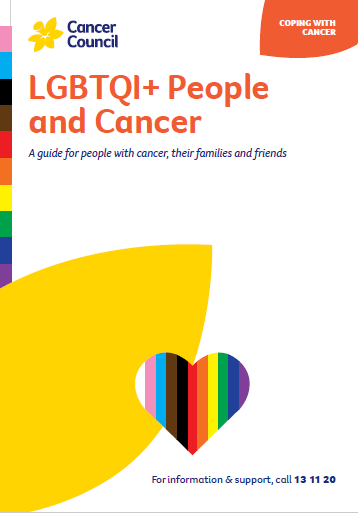- Home
- About Cancer
- LGBTQI+ People and Cancer
- Coping with cancer
- Diversity of experience
Diversity of experience
As well as their sexual orientation, gender and sex characteristics, each person is shaped by their age, race, language, culture, spirituality, disability, education, relationships and financial situation, plus where they live and any previous experiences with the health system.
These factors can overlap to affect health and wellbeing, as well as cancer care. Aside from discrimination for being LGBTQI+, some people may also have had to deal with ageism, sexism, racism or disability discrimination.
Other people may find it difficult to merge different aspects of their identity (e.g. being young, trans) or work out how to communicate their needs to health services.
Some LGBTQI+ communities may have specific experiences that affect their health and wellbeing. Examples include:
| transgender and gender-diverse people | are less likely to access mainstream services because of transphobic attitudes, often have past experiences of misgendering and difficulties getting gender-affirming treatment. |
| intersex people | may have past negative experiences with health professionals, including prior surgery to make them “fit” society’s idea of what it is to be male or female, having had medically unnecessary surgery as a child without their consent, or dealing with health professionals’ lack of knowledge about intersex variations. |
| young people | may have higher rates of distress because of being bullied at school, rejected by family members, or still being in the process of coming out. |
| older people | would have likely grown up at a time when being homosexual was considered an illness or a crime and may have experienced discrimination, family rejection and social isolation. |
| Aboriginal and Torres Strait Islander people | brother boys or sister girls may face added discrimination from being both LGBTQI+ and Aboriginal or Torres Strait Islander (from the wider community, their own community, or both). |
| culturally and linguistically diverse people and refugees | may face discrimination from within their community as well as the LGBTQI+ communities, leading to feelings of stigma and shame. |
| people with disability | may face discrimination from being both LGBTQI+ and a person with disability, which may lead to difficulties accessing services and having their sexual orientation, sexual needs or gender recognised. |
| people living in regional or rural areas | may be more socially isolated, less supported to come out, and have less access to LGBTQI+ specific services. |
→ READ MORE: Fear of discrimination
Podcast: Coping with a Cancer Diagnosis
Listen to more of our podcast for people affected by cancer
We thank the chief investigators from the Out with Cancer research project: Prof Jane Ussher, Prof Janette Perz, Prof Martha Hickey, Prof Suzanne Chambers, Prof Gary Dowsett, Prof Ian Davis, Prof Katherine Boydell, Prof Kerry Robinson and Dr Chloe Parton. Partner investigators were Dr Fiona McDonald and A/Prof Antoinette Anazodo. Research Associates were Dr Rosalie Power, Dr Kimberley Allison and Dr Alexandra J. Hawkey.
We thank the reviewers of our LGBTQI+ People and Cancer booklet: Prof Jane Ussher, Chair, Women’s Heath Psychology and Chief Investigator, Out with Cancer study, Western Sydney University, NSW; ACON; Dr Kimberley Allison, Out with Cancer study, Western Sydney University, NSW; Dr Katherine Allsopp, Supportive and Palliative Care Specialist, Westmead Hospital, NSW; A/Prof Antoinette Anazodo OAM, Paediatric and Adolescent Oncologist, Sydney Children’s Hospital, NSW; Megan Bathgate, Consumer; Gregory Bock, Clinical Nurse Consultant–Oncology Coordinator, Urology Cancer Nurse Coordination Service, WA Cancer & Palliative Care Network, WA; Morgan Carpenter, Executive Director, Intersex Human Rights Australia (formerly OII Australia); Prof Lorraine Chantrill, Medical Co-Director Cancer Services, Illawarra Shoalhaven Local Health District, NSW; A/Prof Ada Cheung, Endocrinologist, Head, Trans Health Research Group, Department of Medicine (Austin Health), The University of Melbourne, VIC; Bonney Corbin, Australian Women’s Health Network; Cristyn Davies, Research Fellow, Specialty of Child and Adolescent Health, Faculty of Medicine and Health, The University of Sydney and Children’s Hospital Westmead Clinical School, NSW; Prof Ian Davis, Professor of Medicine, Monash University and Eastern Health, Medical Oncologist, Eastern Health, Chair, ANZUP Cancer Trials Group, VIC; Rebecca Dominguez, President, Bisexual Alliance Victoria; Liz Duck-Chong, Projects Coordinator, TransHub and Trans Health Equity, ACON, NSW; Lauren Giordano, 13 11 20 Consultant, Cancer Council NSW; Hall & Wilcox (law firm); Natalie Halse, BCNA Consumer Representative; Jem Hensley, Consumer; Prof Martha Hickey, Professor of Obstetrics and Gynaecology, The University of Melbourne, and Director of the Gynaecology Research Centre, The Women’s Hospital, VIC; Kim Hobbs, Clinical Specialist Social Worker – Gynaecological Cancer, Westmead Hospital, NSW; Dr Laura Kirsten, Principal Clinical Psychologist, Nepean Cancer Care Centre, NSW; Amber Loomis, Policy and Research Coordinator, LGBTIQ+ Health Australia; Julie McCrossin and Melissa Gibson, Consumers; Dr Fiona McDonald, Research Manager, Canteen, NSW; Dr Gary Morrison, Shine a Light (LGBTQIA+ Cancer Support Group); Penelope Murphy, Cancer Council NSW Liaison, Prince of Wales Hospital, NSW; Dr Rosalie Power, Out with Cancer study, Western Sydney University, NSW; Jan Priaulx, 13 11 20 Consultant, Cancer Council NSW; Paul Scott-Williams, Consumer; Simone Sheridan, Sexual Health Nurse Consultant, Sexual Health Services, Austin Health, VIC; Cheryl Waller and Rhonda Beach, Consumers.
View the Cancer Council NSW editorial policy.
View all publications or call 13 11 20 for free printed copies.
